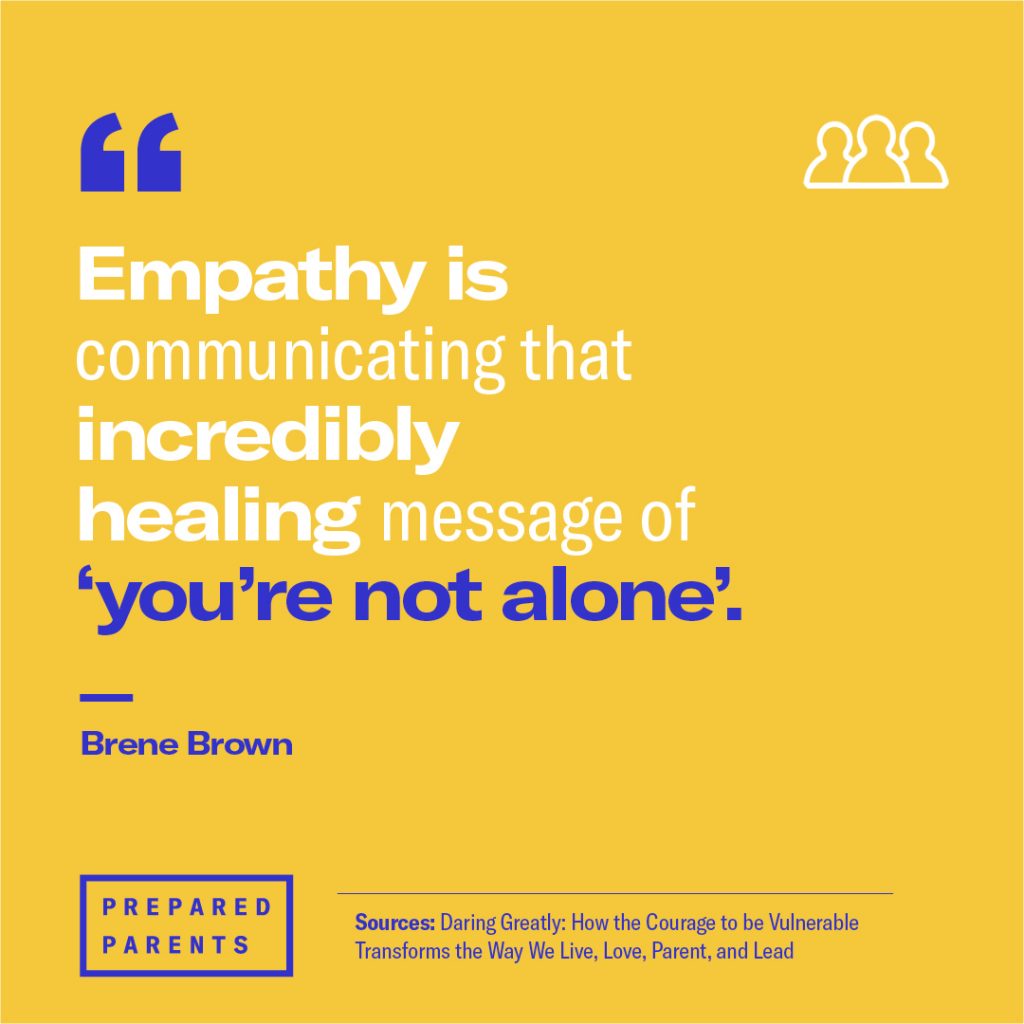Kids have a tendency to be me-focused. But in reality, life is not all about me. It’s about connecting with others. To do that, kids need to learn empathy.

Empathy is how we make connections with others. It’s our ability to understand and experience how they feel and respond with understanding in helpful ways. Empathy is at the heart of what it means to be human and is the foundation for acting ethically, building good relationships, loving well, and living successful lives.
Empathy is one of the16 Habits of Success that Prepared Parent’s resources are rooted in. The Habits of Success are social and emotional mindsets and behaviors that set kids up for success in school and life. They were developed by educational psychologist Dr. Brooke Stafford-Brizard of education research non-profit Turnaround for Children, in her Building Blocks for Learning Framework.
The second row of the framework is Academic and Life Readiness and includes three Habits:
- Self-awareness: Being aware of what I think, feel, and do; my strengths and weaknesses; and the impact I have on other people
- Empathy/relationship skills: Understanding how others might feel and having the skills to maintain strong relationships with people
- Executive functions: Concentrating, staying organized, juggling lots of things happening at once, and planning for the future
These are important skills to develop earlier in life, so that higher-order habits can be developed on top of them. When our kids master these academic and life readiness skills, they’re ready to take on all kinds of tasks, from goal-setting to teamwork, with an understanding of their own strengths and weaknesses, the emotions and needs of others, and how they can pitch in to contribute to the greater good.
Through brain mapping neuroscientists have discovered that even while not directly engaged in an activity that involves empathy, a person’s empathic disposition is noticeable. Just about everyone has the capacity to be empathetic and with a little training they can learn to show it.
Teach your kids self-care
Kids may not express empathy because another feeling is blocking the way. Their ability to care for others may be overwhelmed by anger, shame, or jealousy. Helping children manage these negative feelings can release empathy within themselves.
- Ask your kid to Identify their feelings, and encourage them to talk to you about why they’re feeling that way.
- Try a mindfulness exercise. In times of uncertainty, these exercises can help kids to calm down and become more aware of their moods and thoughts.
- Identify areas of conflict and then work together to find resolutions
Resist your urge to “fix it” for them
Honoring our kid’s feelings doesn’t mean we fix their problems, as that strips them of their agency. Instead, we put on our listening ears and really listen, without distractions, to be in tune with them.
Don’t encourage your kid to play the victim
An unintended consequence of really listening to your kid can be that it may encourage them to play the victim to get your attention. How to avoid this? Once your kid calms down, get into problem-solving mode. Together brainstorm What would I do differently if I traveled back in time? Don’t feed injustice or deny it. Instead, try role-playing with your kid and craft an alternate scenario.
Put yourself in your kid’s shoes
When we empathize with our kid, we’re developing a trusting, secure attachment. This becomes a virtuous cycle as they now want to adopt our values and model our behavior. So, now they can step into our shoes.
- Show them they matter.
- Tune into their needs and help them label their emotions.
- Choose words wisely to respond to how they feel like, “I know you’re feeling sad right now, but I’m here for you.”
- Understand their personality.
- Take a genuine interest in their lives.
- Guide them towards activities that recognize who they are.
Model it.
Absolutely the best way to teach our kids anything, including empathy, is to model it for them. When your kid sees you practicing empathy, they’ll want to try it too.
Reach out to others
Make a list of ways to reach out to others in the neighborhood, the larger community, and at school. Those others may live in the house with you, so ask your kid to consider how they can show empathy to siblings, parents, and other family members.
Here are a few ideas:
- Write thank you letters to essential workers and others in the community to show appreciation for all they do.
- Leave a plate of cookies for the mail carrier or trash collectors.
- Call an elderly neighbor to check in.
- Do something kind for a sibling or parent.
Adopt a worldview
Broaden your kid’s circle of concern by talking about the larger world they inhabit. This is an opportunity for a real-world learning moment. Begin with a problem, question, or challenge and ask your kid to perform a task that directly addresses the problem. This will move them towards finding a solution.
- Give feedback that will lead to further addressing the problem so that they see improvement as they continue.
- Ask your kid to develop a way to present their solution to the problem. This can be a model, a designed website, a campaign, building plan, or even a business idea that can resolve the issue they’re looking at.
Be kind to each other
It’s easy to get irritated with other people, but before things escalate, ask your kid to take a step back and put themselves in your shoes (or their sibling’s) and reflect on ways to practice kindness in the household.
If you’re looking to learn more about practicing and teaching empathy, there are several books to choose from to teach young kids about empathy.

